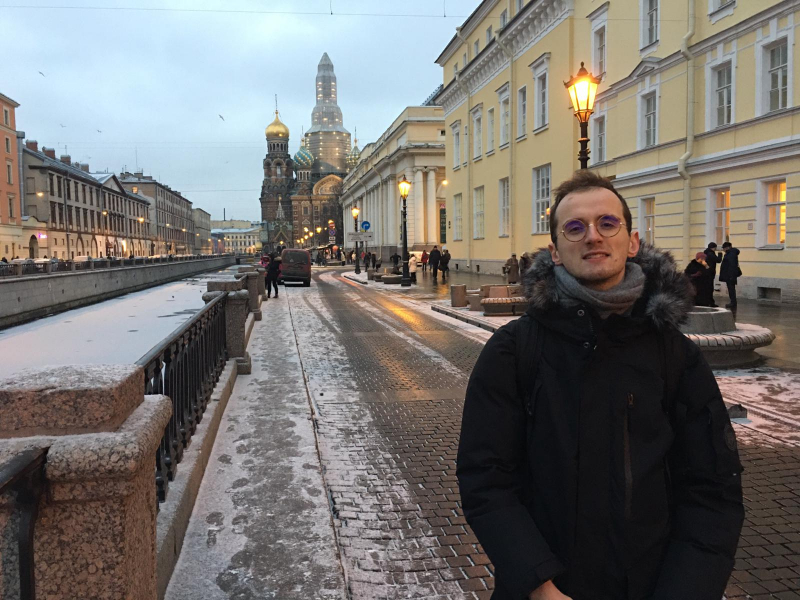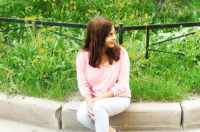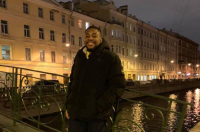Why did you decide to do a part of your Master’s in ITMO?
My background is in physics and mechanics, not in optics, so it was a very good opportunity for me. I wanted to come to ITMO because I wanted to spend one semester in a university where the scientific level is higher than my school and that is not so easy to find. Some universities are very famous but they don’t offer the education that I’m looking for so it’s not so interesting for me.
A few years ago, Lorraine, my university in Nancy, signed a partnership agreement with ITMO. I wasn’t sure how everything would turn out and was clueless about how to live in Russia. I faced some problems, for instance, the registration, which I believe is a common problem among foreigners, and also some issues that didn’t bother me. I want to see the bright side, and everyone was very kind. And of course, the school has a nice scientific level. It was perfect.
What was the first thing you did when you arrived in St Pete?
The first thing I did was to drink tarhun and go to a Georgian restaurant, which for me was amazing. I like a lot of different cuisines and very much enjoy Russian food, especially soups. My favorite is borsch, I even know how to cook it!
Have you tried cooking borsch in France?
Yeah, but I figured out I needed a lot of species I can only buy in Russia and they’re fundamental for the taste, so I need to buy them here and take it to France. The flavor is crucial when you cook borsch.
Have your parents been to St. Petersburg?
My mum came at the end of December, so there wasn’t a lot of daylight and it wasn’t very bright even then. Their first reaction was, “Oh no, where is the sun?” And also the sidewalks on the street had snow and were completely covered with ice, so it was very slippery. I fell like ten times. It wasn’t a pleasant experience for my mother or me, but she thought the city was very beautiful. We visited the main touristic places, the Hermitage, St. Isaac's Cathedral, Peterhof, etc. and we also ate at many great places. And, of course, we had some shaverma [street food]. You can’t say you came to St. Petersburg without trying it. We celebrated the New Year drinking vodka at the Palace Square and it was very fun. For my mother, it was an amazing experience.
What would you consider to be the main differences between French and Russian education?
It’s quite complicated. I would say that education is tougher in Russia. In France, we take care of students all the time, too much. For instance, if in a class you have very smart students and ones that aren’t at the same level. Then the teacher would try to balance it by making the ones with lower levels try to play catch up and put in more effort.
In Russia, it’s a more competitive environment. You need to work hard and be smart or you will just be moved aside. Russians have a program they need to follow and they know what they want to teach, so if you’re not able to follow it then you’d have to find a different school that suits you better.
During the first year of my Master’s, there were between twenty and twenty-five people and after one semester there were only ten left. The course wasn’t that hard but the thing is that if you are willing to work hard and ask for help if you need it, you’ll be okay. In France, they will just try to make you feel better. Based on my experiences, here it’s rougher but it’s good for the students.
Was this approach hard for you?
No, not in any way. To be honest I felt a little bit Russian. Even though I don’t speak the language that well.
What are you working on now that made you come back to Russia?
I came to build a collaboration with previous colleagues because in Nancy I’m more of an experimentalist and I want to publish high-quality papers. You need to either have an amazing idea or good modeling and theoretical results to publish faster. I know my colleagues do things the right way and the quality of their work is good, so it makes it easier to do research together and publish a paper faster.
Do you think it’s necessary to be able to collaborate with other people or other groups or can somebody work on their own?
Maybe working on your own was possible 50 years ago but not now. It’s not possible because the world is going too fast. You need a lot of points of view, and that’s why it’s very important to collaborate. It’s the main reason I’m here at ITMO - to collaborate and be more efficient. Not just work faster but produce good quality. I know I can find those qualities in people here.
My PhD advisor has worked with numerous universities and that’s why I like him. He’s very open-minded and also famous. He’s everywhere. And I can’t remark enough how collaborating with different universities and countries is essential. There is an Erasmus program between Lorraine and ITMO and it is a great idea because it makes student exchanges possible and it helps to develop many projects. It’s useful not only in a creative sense but in a financial sense too.
Do you have any advice for students?
You should never give up and work hard, and also remember to always ask questions. Sometimes people think that if they ask questions they will look stupid but just remember that by asking something in class, you are probably helping 20 other students who had the same question and were too shy to ask.
I ask a lot of questions because I want to understand and if you have a problem you have to face it, you can’t run away from it. You have to learn to fix problems because eventually you’ll face one and you’ll need to be ready.
Never give up even if something isn’t easy.



